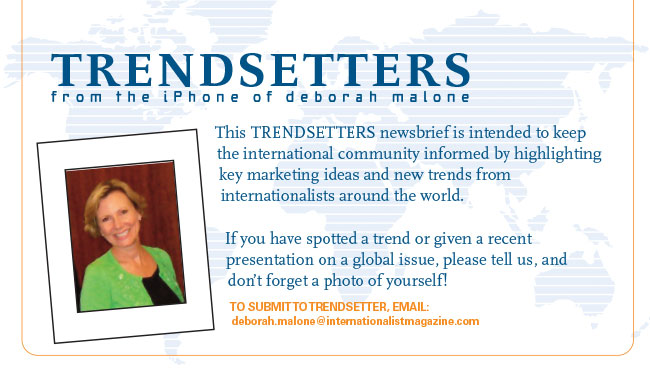


Michael Brenner
Trendsetters: SAP’s Michael Brenner Offers a Perspective on the Future of Marketing
Michael Brenner, Vice President of SAP Marketing & Content Strategy, has long been a well-known advocate for encouraging brands to think like publishers as they seek to connect with customers on both a human and an emotional level. Speaking last week at BtoB’s Digital Edge, he outlined how marketing must change to be in line with the future of business and shared guidelines for marketers as they think differently about content.
Michael is also a terrific collector of eclectic facts that serve to illustrate trends and help to insure that any story is well told. No doubt, this is a reflection of his solid belief in a content approach to marketing. He reminded us that we now live in a media world where we are exposed to over 5,000 marketing messages a day, yet two-thirds of us say to no to telemarketers and 90% of emails are never opened. It is statistically more likely that someone would be struck by lightning than click on a banner ad. The half-life of a piece of content shared on top social networks is merely 3 hours. Typical mobile users check their phone 150 times per day. By 2017, 90% of all internet traffic will be video.
Some facts about overall business trends and consumer relationships with brands were particularly startling as he portrayed today’s new marketing environment. Clearly, technologies are transforming business models faster than our ability to keep up. Consumers are overwhelmed with choice. For example:
- Over 40% of the companies at the top of the Fortune 500 in 2000 were no longer there in 2010. (Brian Solis’ Future of Business)
- 73% of people surveyed wouldn’t care if the brands they use disappeared from their life. (Co.Exist)
- By the end of 2013, there will be more mobile-connected devices than there are people on earth. (Cisco 2013)
- By 2030, 5 billion people – nearly two thirds of global population – could be middle class. (OECD “An Emerging Middle Class”)
Michael Brenner believes that the only way a marketer can break through in this environment is to use content to attract buyers instead of paying to reach them. “It is more effective as it is aligned with buyer needs.” He added, “At SAP, our goal is to connect with consumers through content that doesn’t feel like marketing. We believe that we must earn the right to have a conversation through relevant, provocative content that is daily, social and mobile. Peter Drucker said it best: The aim of marketing is to know and understand the customer so well that the product or service fits him and sells itself.”
In fact, one of SAP’s most effective pieces of content can be found on slideshare. Called “99 Facts on the Future of Business,” it illustrates how technology has altered the pace of change and affected the world. Although nothing appears about SAP other than a twitter hashtag, Brenner affirms that people intuitively understand that a tech company like SAP can help them navigate the future of business. He adds, “It was one of the year’s best shared pieces. Again, it is marketing that doesn’t feel like marketing. We took a simple approach that we thought people would find interesting. It is rapid content that is also attracting a new audience. It is emotional, not promotional.”
Click here to see “99 Facts on the Future of Business”
SAP, headquartered in Germany, with locations in more than 130 countries, is a leader in enterprise application software and software-related services. Their tagline, “The Best-Run Businesses Run SAP” highlights how the company is at the center of the today’s technology and data revolution as it develops innovative ways to help businesses run better.
So what’s Michael Brenner’s advice for producing a strong content marketing program?
According to Brenner, “Content marketing is a mindset that starts with the question ‘what do our buyers want or need?’ It then cycles through the process of analyzing keywords and social trends to find research, experts, and tips that answer those questions.”
He describes Content Marketing as an equal portion of creation, curation and syndication.
- You can’t have all the answers. And likely won’t have enough funds to create all the content you need. But the unique insights and point of view you do have should be the focus of content creation.
- Curation is the art and science of finding the experts, insights and research from others. It is a much more strategic function than most people think, and it is not just about licensing content. Effective content curation will allow you to add your perspective and to package the content for your buyers.
- And finally content syndication (or distribution) is critical to exposing all of this great content to larger audiences.
Keep in mind:
- 78% of CMOs think content is the future of marketing (Demand Metric)
- 60-70% of business-to-business content goes unused (Sirius Decisions)
- Only 10-20% of a company’s website content drives 90% of its Web traffic, and only 0.5% of a website’s content drives more than 50% of its traffic. (InboundWriter)
What is Michael Brenner’s take on the future of marketing as we approach 2014?
- The world has changed since the birth of the internet and social media, so the future of marketing needs to change.
- There needs to be a shift in cultural mindset within business. It must become customer centric. Today a business cannot be sustained with content that is simply ignored.
- Content needs to be visual, consumable and snackable
- Brands increasingly must become publishers and think of a newsroom approach to content creation.
- There will be continued trends with brands aligning more closed with existing publisher though sponsored content. Native Ads will only work when they create great content and they do not mislead an audience. (An audience is smarter than we assume.)
- Brands will also become entertainers. People want to be entertained as much as they want to be informed or educated.
